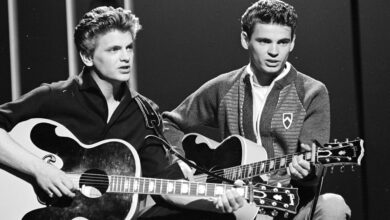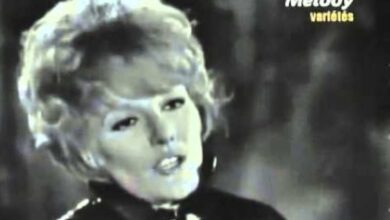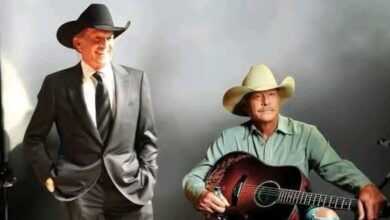Village People Delivered an Iconic Performance of “Y.M.C.A.”
In the vibrant tapestry of late 1970s disco, few songs have achieved the enduring legacy of the Village People’s “Y.M.C.A.” Released in 1978, this infectious anthem not only dominated dance floors but also became a cultural touchstone, transcending its era to remain a beloved classic.
The Village People, conceived by French producers Jacques Morali and Henri Belolo, were a unique ensemble designed to embody various American male stereotypes. Their lineup featured characters like the policeman, the cowboy, the construction worker, and the Native American, each portrayed with flamboyant flair. This concept was both a nod to and a celebration of gay culture, though the group’s appeal quickly broadened to mainstream audiences.
“Y.M.C.A.” was born from a collaboration between Morali and lead singer Victor Willis. As the story goes, Morali inquired about the Young Men’s Christian Association, curious about its significance. Willis explained that the YMCA was a place where young men could find camaraderie, engage in sports, and access affordable lodging. Inspired, they penned a song that highlighted these virtues, crafting lyrics that invited listeners to “hang out with all the boys” and enjoy the organization’s offerings.
Upon its release, “Y.M.C.A.” soared up the charts, reaching number two on the U.S. Billboard Hot 100 in early 1979, just behind hits like Chic’s “Le Freak” and Rod Stewart’s “Da Ya Think I’m Sexy?” Its catchy melody and upbeat tempo made it a favorite in clubs and on radio stations alike. Internationally, the song achieved even greater success, topping charts in over 15 countries and solidifying the Village People’s global fame.
The song’s accompanying music video further cemented its iconic status. Filmed in New York City, it showcased the band members dancing and singing in various urban settings, including outside the McBurney YMCA on West 23rd Street. The imagery of the group performing synchronized moves, combined with their distinctive costumes, created a visual spectacle that resonated with audiences and became emblematic of the disco era.
One of the most enduring aspects of “Y.M.C.A.” is the dance associated with it. During live performances and at various events, audiences began forming the letters “Y,” “M,” “C,” and “A” with their arms in time with the chorus. This participatory dance became a phenomenon, turning the song into a staple at weddings, sporting events, and parties, where it continues to unite people in joyous movement.
Over the years, “Y.M.C.A.” has been the subject of various interpretations. Some view it as a celebration of gay culture, pointing to the Village People’s origins and the song’s subtext. Victor Willis, however, has consistently refuted this notion, stating that the song was not intended as a gay anthem but rather as a fun, uplifting track about the YMCA’s role in urban communities. He emphasized that the lyrics were inspired by the activities and opportunities the YMCA provided, especially for young black men in cities.
The song’s legacy has been further complicated by its association with political events. Notably, former U.S. President Donald Trump adopted “Y.M.C.A.” as a closing anthem at his rallies during his 2020 re-election campaign. This usage led to renewed discussions about the song’s meaning and its place in popular culture. While some members of the LGBTQ+ community expressed discomfort with this association, Willis acknowledged that Trump’s use of the song brought it back into the spotlight, leading to a resurgence in its popularity.
In recognition of its cultural, historical, and aesthetic significance, “Y.M.C.A.” was inducted into the Grammy Hall of Fame in 2020. The same year, the U.S. Library of Congress selected the song for preservation in the National Recording Registry, highlighting its enduring impact on American music and culture.
Beyond its chart success and accolades, “Y.M.C.A.” has left an indelible mark on the music industry. It exemplifies the power of disco to bring people together, transcending boundaries of age, race, and sexuality. The song’s universal appeal lies in its infectious energy and the sense of community it fosters, inviting everyone to join in and celebrate.
The Village People’s career, buoyed by the success of “Y.M.C.A.,” includes other notable hits like “Macho Man” and “In the Navy.” However, it is “Y.M.C.A.” that stands out as their signature song, a track that encapsulates the exuberance of the disco era and continues to inspire joy and unity decades after its release.
In the years since its debut, “Y.M.C.A.” has been covered, parodied, and referenced in countless ways, attesting to its lasting influence. From commercials to movies, the song’s presence in media underscores its status as a cultural icon. Its melody and message have been embraced by successive generations, ensuring that it remains a vibrant part of the musical landscape.
In conclusion, “Y.M.C.A.” is more than just a disco hit; it is a testament to the enduring power of music to uplift and unite. The Village People’s creation has transcended its origins to become a global anthem, celebrated for its infectious rhythm, memorable lyrics, and the sense of community it promotes. As long as there are gatherings where people seek joy and connection, it’s likely that “Y.M.C.A.” will continue to play, inviting all to join in the dance.



